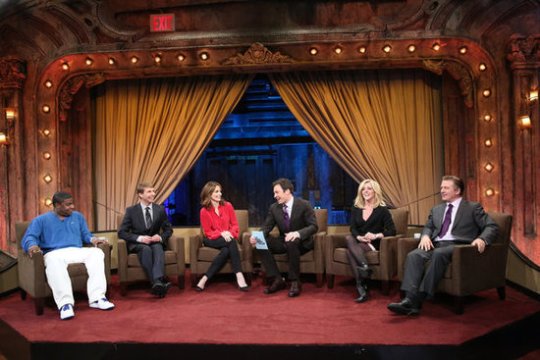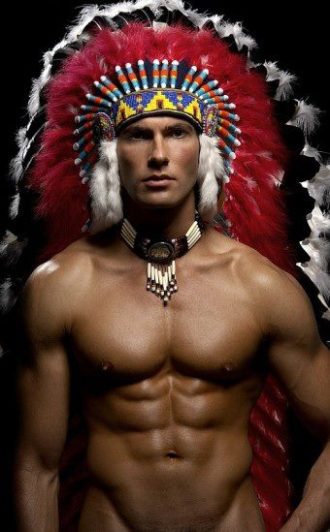Being a problematic, flawed, and contradictory human being, I will freely admit that I watch and am entertained by certain popular shows I would never describe as critically conscious or racially progressive. I’m not sure that any such show exists on television. I will also admit that 30 Rock does not fall into the entertainment category because I am personally biased against finding it endearing. Yes, The Office tried to get away with a peripheral character in Blackface as part of a “Christmas tradition” in the holiday episode of their current season. No, this does not get a pass because I’ve been a fan of the show for six years. So while I acknowledge that the shows I happen to like are equally deserving of the same scrutiny and criticism, they are not the subject of this particular post.
Last week the “stars” of 30 Rock appeared on Late Night with Jimmy Fallon to reflect on their seventh and final season. And one might ask: why watch the interview if you don’t like the show? Please refer to paragraph one, sentence one. I was watching Late Night because ‘I hearty Jimmy,’ and I watched most of the interview with the 30 Rock cast because I was curious to see if they would address the multiple spectacles of racist humor and uses of Blackface on the show—if even for a moment.
And the moment came.
When it was Jane Krakowski’s turn to share her favorite clip from the series, the actor who “portrays” a self-obsessed actor chose a clip prominently featuring her own character, Jenna Maroney. Most importantly, this was an opportunity to publicly downplay and ignore the two instances (that I know of) where she appeared in Blackface on the show; instead, she used the interview as an opportunity to publicly showcase it. Her introduction began something like this: “Well, once we established that Jenna was totally insane, we could get away with anything.” This is no excuse to disguise racist humor, in my opinion, but I momentarily hoped she was laying the groundwork for a follow-up commentary on their moral opposition to racism and some explanation of Blackface as “social satire.” I wouldn’t cosign this as a justification for Blackface from a sitcom, but that wasn’t even the justification she tried to make. A series of homophobic and transphobic remarks linking her character’s “insanity” to her “gender changing” for an xmas party costume were all that followed.
The clip played. On the left is Jenna’s “shman” (Will Forte) dressed as Natalie Portman in Black Swan, and on the right is Jenna in Blackface as Pittsburgh Steelers athlete Lynn Swan, completing their couples costume of “two black swans.”

Jane Krakowski would only address the fact that her character had temporarily assumed a different gender identity, and made absolutely no mention of the fact that she was also dressing up as Black. It was when Krakowski described her character as participating in “gender changing” that Tina Fey casually interrupted her a few moments later to add “and race changing,” which I translated as her white code words for Blackface. No one called it what it is, reminding me of the phrase coined by Toni Morrison: “racetalk,” or the “explicit insertion into everyday life of racial signs and symbols that have no meaning other than pressing African-Americans to the lowest level of the racial hierarchy.” To me, this exemplifies the marriage of white liberalism and political correctness. A show like 30 Rock can celebrate feminist subplots and liberal politics while still reinforcing dehumanizing racial tropes and employing casual racism under the banner of “irony.” And when they use very clear and unequivocal Blackface, symbolic language disguises it as “race changing.”
Historical amnesia and neutrality in entertainment allow whites to be “pioneers” all over again, thereby enabling discussions of racist humor to be either congratulatory or effectively mundane and placating. I also sense a desire to treat the use of Blackface as courageous, edgy, and worthy of the highest recognition, as Robert Downey Jr.’s Oscar nomination for his Blackface role in Tropic Thunder would attest. When an equation is drawn between Jenna Maroney’s “gender changing” and “race changing,” this wrongly suggests these politics and identities are interchangeable, if not identical—something straight/cis/white folks are neither qualified nor entitled to decide. Drawing this equation also suggests that conservative boundaries are being liberally pushed when a white woman dresses up like a Black man and sings a song next to a white male dressed as a white woman. So this display of transphobia and racism (treating trans and Black identities as comic costumes) are casually transformed into harmless entertainment and white folks can continue the fantasy that we are pushing our own prejudiced boundaries.
Eduardo Bonilla-Silva (co-author of Racism Without Racists and White Out: The Continuing Significance of Racism) has identified a “new racism” in the US as a subtle, subversive, and often casual racism that has become more commonplace than the overt, hostile, and explicit racism of previous decades. Don’t get excited—this does not mean the hostile and the explicit have vanished and been completely replaced. He is talking about public discourses of white liberalism where issues involving race are whitewashed and/or “sugarcoated” to avoid the accusation of racism. So if Tina Fey can sugarcoat Blackface as some kind of random/everyday “race changing,” she can avoid accountability for the very specific, historical, and racist meaning of this recycled comedy.
Creators and writers can only project so far: they can try to make it seem as if the racism and racist humor of their characters are disconnected fictions without any basis in reality, but characters like Jenna Maroney are not improvised—she and her Blackface are consciously created and actively written. The characters on a show might be “insane,” but behind every crazy character is a calculating and moderately sane writer. I don’t care if writers are dropping acid and taking body shots, teams that write for hit shows on mega networks make critical decisions, approve content, and get their shit together eventually. And 30 Rock is one of the most, if not the most, celebrated and awarded television comedies in the history of television comedies. This is more proof for the point that something that was once explicitly hostile and gratuitously demeaning in previous decades (Blackface) can be transformed into a subtle, neutral, and sugarcoated version of the original in the contemporary moment. Tina Fey can put lipstick on a pig, but it’s still a pig.
—DD





